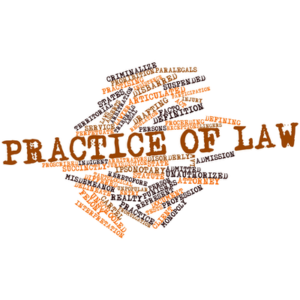 What is the Unauthorized Practice of Law?
What is the Unauthorized Practice of Law?
Texas’ statutes prohibit people from “practicing law” when unauthorized and even provide penalties for doing so. But what does it mean to violate these statutes and possibly open oneself up to legal penalties for such conduct?
Texas Government Code Section 81.101
This statute reads in part: (a) In this chapter the “practice of law” means the preparation of a pleading or other document incident to an action or special proceeding or the management of the action or proceeding on behalf of a client before a judge in court as well as a service rendered out of court, including the giving of advice or the rendering of any service requiring the use of legal skill or knowledge, such as preparing a will, contract, or other instrument, the legal effect of which under the facts and conclusions involved must be carefully determined.
Texas Government Code Section 81.102
This statute reads in part: (a) Except as provided by Subsection (b), a person may not practice law in this state unless the person is a member of the state bar.
Texas Occupational Code Section 1101.654
This statute is of particular importance to licensees such as real estate or insurance licensees and reads:
(a) The commission shall suspend or revoke the license or certificate of registration of a license or certificate holder who is not a licensed attorney in this state and who, for consideration, a reward, or a pecuniary benefit, present or anticipated, direct or indirect, or in connection with the person’s employment, agency, or fiduciary relationship as a license or certificate holder:
(1) drafts an instrument, other than a form described by Section 1101.155, that transfers or otherwise affects an interest in real property; or
(2) advises a person regarding the validity or legal sufficiency of an instrument or the validity of title to real property.
(b) Notwithstanding any other law, a license or certificate holder who completes a contract form for the sale, exchange, option, or lease of an interest in real property incidental to acting as a broker is not engaged in the unauthorized or illegal practice of law in this state if the form was:
(1) adopted by the commission for the type of transaction for which the form is used;
(2) prepared by an attorney licensed in this state and approved by the attorney for the type of transaction for which the form is used; or
(3) prepared by the property owner or by an attorney and required by the property owner.
Texas Penal Code § 38.123
This criminal statute reads in part:
(a) A person commits an offense if, with intent to obtain an economic benefit for himself or herself, the person:
(1) contracts with any person to represent that person with regard to personal causes of action for property damages or personal injury;
(2) advises any person as to the person’s rights and the advisability of making claims for personal injuries or property damages;
(3) advises any person as to whether or not to accept an offered sum of money in settlement of claims for personal injuries or property damages;
(4) enters into any contract with another person to represent that person in personal injury or property damage matters on a contingent fee basis with an attempted assignment of a portion of the person’s cause of action; or
(5) enters into any contract with a third person which purports to grant the exclusive right to select and retain legal counsel to represent the individual in any legal proceeding.
(b) This section does not apply to a person currently licensed to practice law in this state, another state, or a foreign country and in good standing with the State Bar of Texas and the state bar or licensing authority of any and all other states and foreign countries where licensed.
Conclusion
As shown, there can be consequences for holding oneself out as competent to provide legal services to others and to taking it upon oneself to step outside the bounds of one’s own licensure (such as that of a real estate agent), even for the purposes of expediency or efficiency. For these reasons, it is advisable that licensed professionals refer their clients to attorneys when appropriate and that people considering tort actions seek out licensed attorneys who can properly represent their interests in accordance with Texas law.
